#disability emote
Explore tagged Tumblr posts
Text
Disabilty pride spoon for those who use spoon theory.







#spoon theory#disabilty#disability pride month#spoonie#spoon theory emoji#spoon theory emote#disabled#disability pride flag#disability pride#disabilty emoji#disability emote#disabled pride#disabled emoji#custom emote#custom emoji#my emojis#discord emoji#emoji#one spoon#two spoons#three spoons#no spoons#🥄#🥄🥄#🥄🥄🥄#🚫#🚫🥄#❌#❌🥄#no words
107 notes
·
View notes
Text
Republishing emotes pt. 2!!
again, all of em are f2u but with credit! do not repost in any other social media, TYSM💗
Featuring ;; an "insuline time" emote with a drawn humalog insulin pen. two raspberry emotes; one playful, one angry. a shocked blushed emote. a shocked sweating emote. a laughing, uncomfortable emote. four different versions of a single emote; the first is a smiling emote with a verbal stim that reads "beep boop", the second is that same emote but it reads "boop", the third is that same emote but it reads "beep" instead, and the fourth is just the smiling face of the emote.






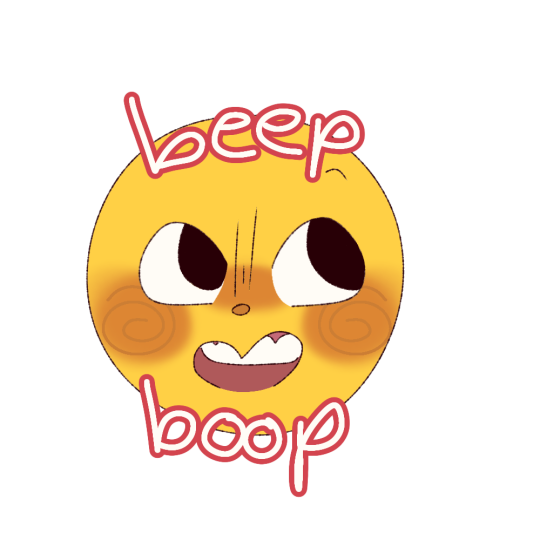
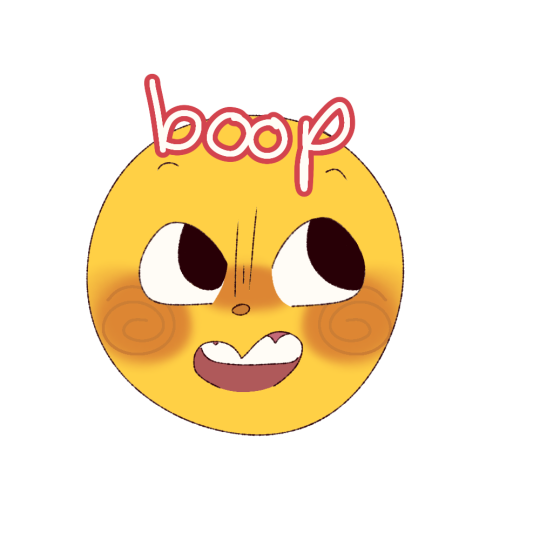


#🔌 ⨟⨟ emote central#🎲 ⨟⨟ stim emotes#💉 ⨟⨟ disability related emotes#disabled#disability emote#disability emoji#custom emote#custom emoji#discord emojis#discord emote#discord emoji#discord emotes#ghostlyart
13 notes
·
View notes
Text
I feel like there are a lot of people out there who needs to hear this:
If you dropped out of school because of diagnosed (or undiagnosed) ADHD, Autism, ADD, OCD, Dyslexia, Anxiety, Depression, Bipolar disorder, psychotic disorders, schizophrenia etc… You did not fail. The education system failed you.
#neurodiverse stuff#i cannot say this enough#neurodivergent#actually adhd#adhd problems#autism#just autistic things#actually autistic#actually bpd#actually mentally ill#actually disabled#depressing shit#this gave me more emotional damage than my dad#i am going to rant#i am going insane#dropping out#school problems#send help#you can do this#you cannot convince me otherwise#you can't change my mind#you can do it#i believe in you#i believe in their healing powers#i believe in myself#academic assignments#assignmentwriting#assignment help#in this essay i will
23K notes
·
View notes
Text
As I keep shouting into the void, pathologizers love shifting discussion about material conditions into discussion about emotional states.
I rant approximately once a week about how the brain maturity myth transmuted “Young adults are too poor to move out of their parents’ homes or have children of their own” into “Young adults are too emotionally and neurologically immature to move out of their parents’ homes or have children of their own.”
I’ve also talked about the misuse of “enabling” and “trauma” and “dopamine” .
And this is a pattern – people coin terms and concepts to describe material problems, and pathologization culture shifts them to be about problems in the brain or psyche of the person experiencing them. Now we’re talking about neurochemicals, frontal lobes, and self-esteem instead of talking about wages, wealth distribution, and civil rights. Now we can say that poor, oppressed, and exploited people are suffering from a neurological/emotional defect that makes them not know what’s best for themselves, so they don’t need or deserve rights or money.
Here are some terms that have been so horribly misused by mental health culture that we’ve almost entirely forgotten that they were originally materialist critiques.
Codependency What it originally referred to: A non-addicted person being overly “helpful” to an addicted partner or relative, often out of financial desperation. For example: Making sure your alcoholic husband gets to work in the morning (even though he’s an adult who should be responsible for himself) because if he loses his job, you’ll lose your home. https://www.nytimes.com/2022/07/08/opinion/codependency-addiction-recovery.html What it’s been distorted into: Being “clingy,” being “too emotionally needy,” wanting things like affection and quality time from a partner. A way of pathologizing people, especially young women, for wanting things like love and commitment in a romantic relationship.
Compulsory Heterosexuality What it originally referred to: In the 1980 in essay "Compulsory Heterosexuality and Lesbian Existence," https://www.journals.uchicago.edu/doi/abs/10.1086/493756 Adrienne Rich described compulsory heterosexuality as a set of social conditions that coerce women into heterosexual relationships and prioritize those relationships over relationships between women (both romantic and platonic). She also defines “lesbian” much more broadly than current discourse does, encompassing a wide variety of romantic and platonic relationships between women. While she does suggest that women who identify as heterosexual might be doing so out of unquestioned social norms, this is not the primary point she’s making. What it’s been distorted into: The patronizing, biphobic idea that lesbians somehow falsely believe themselves to be attracted to men. Part of the overall “Women don’t really know what they want or what’s good for them” theme of contemporary discourse.
Emotional Labor What it originally referred to: The implicit or explicit requirement that workers (especially women workers, especially workers in female-dominated “pink collar” jobs, especially tipped workers) perform emotional intimacy with customers, coworkers, and bosses above and beyond the actual job being done. Having to smile, be “friendly,” flirt, give the impression of genuine caring, politely accept harassment, etc. https://weld.la.psu.edu/what-is-emotional-labor/ What it’s been distorted into: Everything under the sun. Everything from housework (which we already had a term for), to tolerating the existence of disabled people, to just caring about friends the way friends do. The original intent of the concept was “It’s unreasonable to expect your waitress to care about your problems, because she’s not really your friend,” not “It’s unreasonable to expect your actual friends to care about your problems unless you pay them, because that’s emotional labor,” and certainly not “Disabled people shouldn’t be allowed to be visibly disabled in public, because witnessing a disabled person is emotional labor.” Anything that causes a person emotional distress, even if that emotional distress is rooted in the distress-haver’s bigotry (Many nominally progressive people who would rightfully reject the bigoted logic of “Seeing gay or interracial couples upsets me, which is emotional labor, so they shouldn’t be allowed to exist in public” fully accept the bigoted logic of “Seeing disabled or poor people upsets me, which is emotional labor, so they shouldn’t be allowed to exist in public”).
Battered Wife Syndrome What it originally referred to: The all-encompassing trauma and fear of escalating violence experienced by people suffering ongoing domestic abuse, sometimes resulting in the abuse victim using necessary violence in self-defense. Because domestic abuse often escalates, often to murder, this fear is entirely rational and justified. This is the reasonable, justified belief that someone who beats you, stalks you, and threatens to kill you may actually kill you.
What it’s been distorted into: Like so many of these other items, the idea that women (in this case, women who are victims of domestic violence) don’t know what’s best for themselves. I debated including this one, because “syndrome” was a wrongful framing from the beginning – a justified and rational fear of escalating violence in a situation in which escalating violence is occurring is not a “syndrome.” But the original meaning at least partially acknowledged the material conditions of escalating violence.
I’m not saying the original meanings of these terms are ones I necessarily agree with – as a cognitive liberty absolutist, I’m unsurprisingly not that enamored of either second-wave feminism or 1970s addiction discourse. And as much as I dislike what “emotional labor” has become, I accept that “Women are unfairly expected to care about other people’s feelings more than men are” is a true statement.
What I am saying is that all of these terms originally, at least partly, took material conditions into account in their usage. Subsequent usage has entirely stripped the materialist critique and fully replaced it with emotional pathologization, specifically of women. Acknowledgement that women have their choices constrained by poverty, violence, and oppression has been replaced with the idea that women don’t know what’s best for themselves and need to be coercively “helped” for their own good. Acknowledgement that working-class women experience a gender-and-class-specific form of economic exploitation has been rebranded as yet another variation of “Disabled people are burdensome for wanting to exist.”
Over and over, materialist critiques are reframed as emotional or cognitive defects of marginalized people. The next time you hear a superficially sympathetic (but actually pathologizing) argument for “Marginalized people make bad choices because…” consider stopping and asking: “Wait, who are we to assume that this person’s choices are ‘bad’? And if they are, is there something about their material conditions that constrains their options or makes the ‘bad’ choice the best available option?”
#mad pride#neurodiversity#ableism#ageism#youth rights#liberation#disability rights#classism#capitalism#mental health culture#pop psychology#feminism#emotional labor
7K notes
·
View notes
Text
ppl are too quick to point to laios' disability as the reason his friends think he's a freak sometimes. so many instances of laios getting yelled at are, in my eyes, a case of "this guy had to emotionally mature very early in order to be there for his little sister" combined with "much older friends who never had to learn to manage their own emotions to the same degree"
a lot of the time he's right about needing to be more direct/deal with things in a way that may seem scary/needing to put your gut reaction aside. he tries not to make his friends uncomfortable and he puts up with a lot because he's trying to keep the peace, but he also pushes the others out of their comfort zones purposefully to try to get them to think more constructively. everyone else in the party is prone to acting on their gut instincts and avoiding uncomfortable situations even when facing them head-on is very much necessary. part of what makes laios such a great leader is the fact that he knows from experience how to put his own feelings aside to help someone else grow.
yes, he does make a lot of social blunders by accident and he does struggle to connect with others, but not all of his positive influence on others is accidental or "despite" making people uncomfortable. a lot of the time, I think it's clear he knows exactly what he's doing and he's trying to help the people around him process emotions in a healthy way as they all go through some truly harrowing shit. all the main characters support each other as well as they can with their unique emotional skillsets. laios' skillset just happens to be "gently talk child into eating her vegetables"
#deerchatter#dungeon meshi#laios touden#of course this IS also connected to his disability. bc having an iron grip on your own emotional reaction is often needed to survive#in an ableist society. and he wouldn't have had to parent falin so much if the two of them hadn't been ostracized growing up#but the point of the post is that laios is a lot more emotionally intelligent than his party (or many fans) realizes#he's not just stumbling ass-first into being helpful he is clearly applying a skillset that is direly lacking in his friends#marcille and chilchuck in particular haaaaate uncomfy situations and are under the impression that if smth Feels bad then it Is bad.#and senshi avoids so many situations and feelings because of his trauma that he's been unable to grow past it on his own#this post was particularly inspired by the griffin meat scene. everyone else suggests senshi just avoid his trauma forever#and they're absolutely shocked when laios suggests senshi try to grow and overcome his pain bc. That Sounds Scary. lol#so many of the story's themes revolve around overcoming your own impulses and biases#and laios is uniquely suited to leading that change.#r.i.p. laios/toshiro friendship you guys have so much more in common than you realize
4K notes
·
View notes
Text
a lot of you got a kick out of my service dog’s battle jacket, so i thought i’d share some more pictures of the man himself.
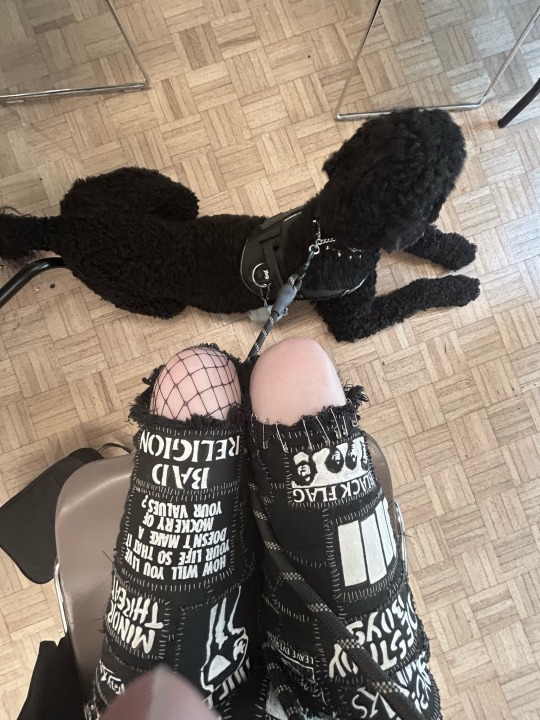
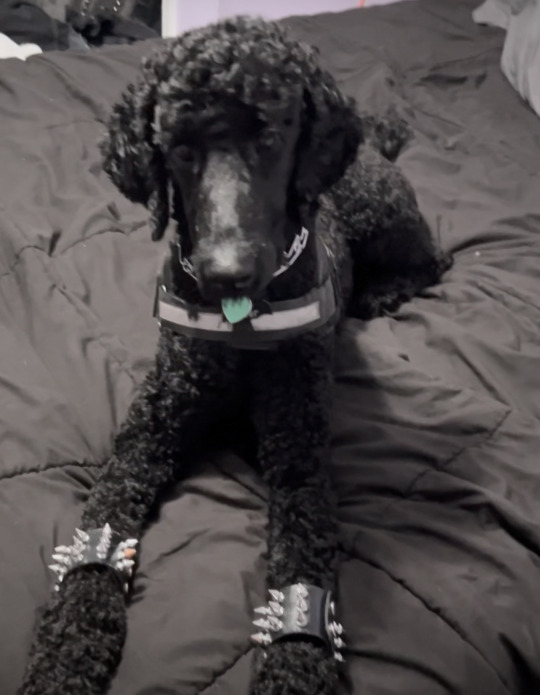
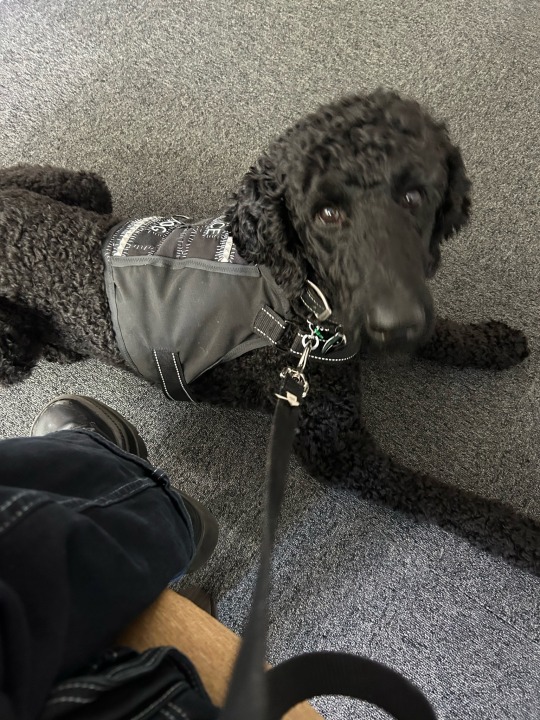
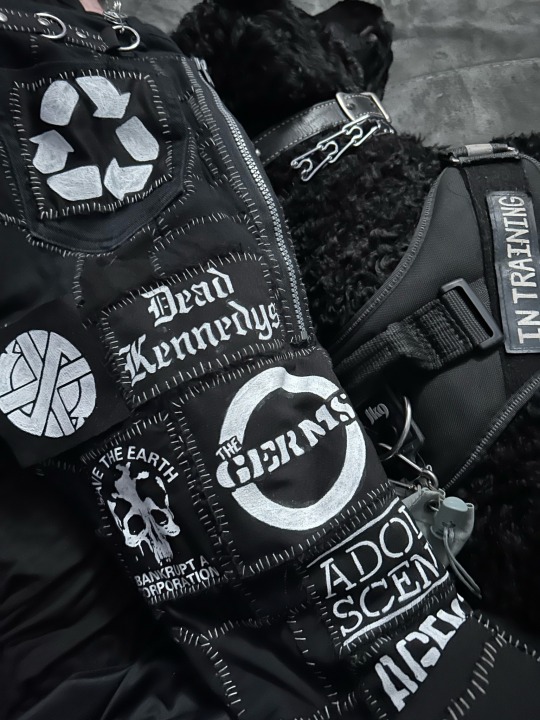
i know people have a lot of stereotypes about what service dogs and their handlers are “supposed” to look like, and it confuses people to see a young, seemingly able bodied punk rocker with a service dog.
but i share this to say, that if you as a disabled person don’t see a life for yourself, you can create one. when i started to realize i was disabled almost 10 years ago, i certainly didn’t imagine this is where i’d be now. in fact, i didn’t even plan to making it to this point.
but a diagnosis doesn’t have to mean the end of the world. sometimes your world is just beginning. some people are of the belief that everything happens for a reason. me, not so much. i’ll never be grateful for the suffering i experienced in this world, but i will always, always be glad i chose to stay in it.
#sorry if this post is like. sappy and more emotional than usual#i know it’s kinda unnecessarily long but u guys like that sometimes#lmk if you want more service dog info im always happy to talk about him#punk#punk patches#diy#punk diy#disability#patches#actually autistic#patch inspo#punk subculture#cripple punk#c punk#disabled punk#chronically ill#service dog#disabled positivity#mental health#tw mental health
2K notes
·
View notes
Text
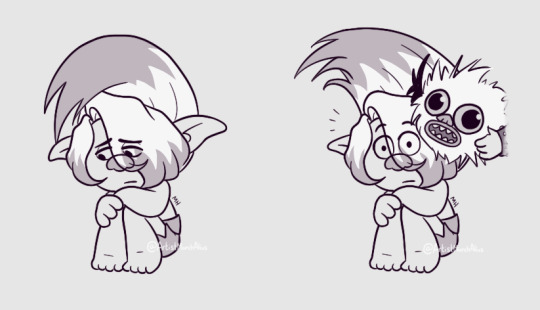
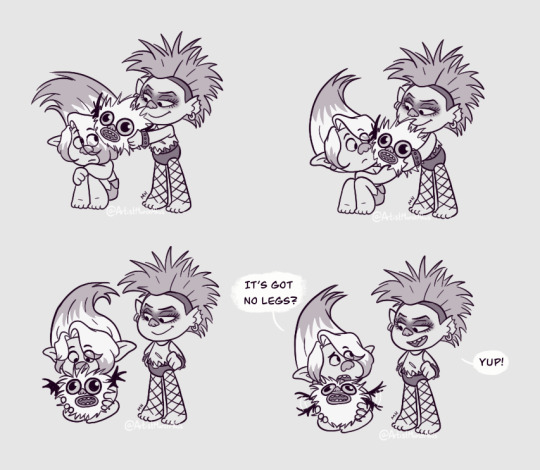

Give Floyd a service bat/emotional support bat!
#trolls band together#dreamworks trolls#trolls Floyd#barb trolls#trolls fanart#trolls comic#trolls 3#tbt#Floyd trolls#trolls barb#trolls world tour#disabled floyd#dumb trolls thought of the day: give Floyd a service bat/emotional support bat#haven’t decided on a name yet
7K notes
·
View notes
Text


Happy disability pride month!
Wanted to share the new ghosties with some mobility aids and medical devices! Remember, you are valid! Take care of yourself this pride month.
#ghosts#ghost#ghost art#disability#disability pride#disabled artist#wheelchair#cane#cane user#crutches#walker#service dog#dog#disability pride flag#emotional support animal#esa#cat#cats#monitor#feeding tube#colostomy bag
790 notes
·
View notes
Text
Reminder
Your pain (physical/mental/emotional) is valid even if nobody can see it
Your pain is valid even if you have no physical symptoms
Your pain is valid even if there is no physical injury
Your pain is valid even if others tell you it's not
Your pain is valid even if you do not have a life threatening disease
Your pain is valid even if you don't have a diagnosis
Your pain is valid even if you do have a diagnosis
Your pain is still valid even if nobody believes you
Your pain is still valid even if you are too "young" for the problem/issue
Your pain is valid even if the health care advisor/anybody tells you that it's in your head
Your pain is valid no matter what the conditions are
Your pain is valid.
Pain does not discriminate between age, gender, race, nationality etc. Just because you can't see pain, doesn't mean it's not there.
#mentalhealth#mental health awareness#mental health support#cronic pain#cronic illness#mental illness#mental health#coping#positive mental attitude#mental wellness#fibromyalgia#chronic illness#chronic pain#chronic fatigue#chronic disability#chronically ill#reminder#self care reminder#self care#self improvement#self help#self love#mental health reminders#mental health matters#mental health recovery#emotional health#healing journey#positivity#positive thoughts#reminders
1K notes
·
View notes
Text
i love doing character analysis for minthara because shes such a wonderful hypocrite. she has a lot of deeply reactionary political views but she makes it openly known shes willing to suspend just about all of them because youve become more important to her than nearly anything else. deeply opinionated but never pushes you to do something you wont throw your weight behind, and if your her partner shell suspend all the "survival of the fittest" cultural upbringing she finds so much sense and empowerment in to make an exception for you specifically and no one else.
i love her
#bg3#bg3 minthara#minthara#minthara baenre#she 100% doesnt care that flights regularly violate ACA standards until they damage YOUR wheelchair specifically#and then she is an absolute NIGHTMARE pulling out every citation in the book and as soon as you get home shes making phone calls for 3 days#she wont fight for anyone else but she WILL fight tooth and nail for YOUR accomodations ANNND compensation for emotional damage on top#ur neighborhood is about to get every award for disability accessibility ur city can hand out. minthy will NOT settle for anything less
233 notes
·
View notes
Text

Day 3



DID emojis !
After recently being diagnosed with DID we decided to make emojis for it! ( we also count it as a under-talked about disorder as most talk about it is online and a lot of the online talk is just fake claiming and gatekeeping ngl )
-Vee ( posting on behalf of Two )

#disorder related#disability related#system related#did system#actually did#emote blog#custom emote#emoji art#emote artist#custom emoji#aac emoji#emojiblr#custom discord emoji#discord emoji#emoji#cute emoji#discord emojis#discord emote#emotes#plural emoji#pluralgang#plural system
262 notes
·
View notes
Text
It's always okay to make things easier for yourself.
There is no special prize in life for doing things the hard way.
#🔍⚔️#disability posting#disability#mental health support#self compassion#emotional health#chronic health problems#abuse survivor#trauma survivor
2K notes
·
View notes
Text
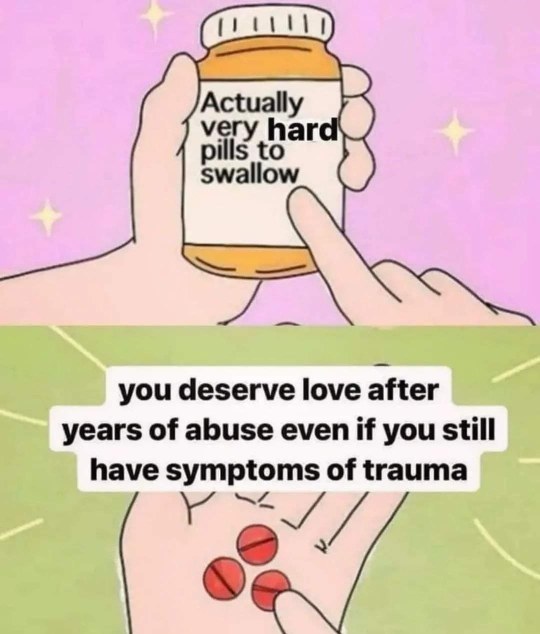
#traumagenic osdd#trauma#just cptsd things#living with cptsd#cptsd recovery#cptsd problems#abuse survival#parental abuse#mental abuse#emotional abuse#verbal abuse#tw abuse#childhood trauma#medical trauma#spoonie#chronically ill#chronic illness#disabled life#disability#mental illness#disabled community#invisible disability#chronic disease#mental heath support#complex ptsd#ptsd#actually ptsd#ptsd recovery#living with ptsd#actually cptsd
3K notes
·
View notes
Text
Don't mind me I'm just crying because I'm reading a fantasy novel with a main character that is an ambulatory wheelchair user (who also uses a prosthetic leg) with chronic pain. This is the first time I've read something like this outside of my own stories.
"In truth, Kissen's leg still ached, it always ached, but it was better than when they arrived. The wheelchair was a blessing. She wasn't used to it and kept wanting to jump up. But it was a relief to be able to rest her hips."
- Hannah Kaner, Godkiller
#Godkiller#I usually am not the biggest fan of multiple POV's in stories#but this one is so good I can't even be mad about it#chronic pain#ambulatory wheelchair user#the rep in this book is so good so far aaaaa#I love books I love disabled characters I love being an emotional little creature!#Hannah Kaner
293 notes
·
View notes
Text
Able-bodied people remember the existence of words such as debilitating, incapacitating, draining, all-consuming, overwhelming, destructive, drastic, limiting, disruptive, excruciating, etc. instead of using a fucking slur challenge: difficulty level impossible
#I beg of yall to put the word 'crippling' into a thesaurus and pick literally any other option it gives u#or like. use the actual word for the emotion ur trying to express#sorry. I saw some shit lmao#<-this has been in my drafts for months so idk what pissed me off but I've decided it's still a good post. so#armchair speaks#actually disabled#physically disabled#cripplepunk
1K notes
·
View notes
Text
sometimes being chronically ill is laying on the floor in pain while the cat tries his very best to help
#he doesn't have a medical degree but he's making me smile so that counts for something#disability#disabled#cpunk#physical disability#physically disabled#emotional support animal
191 notes
·
View notes